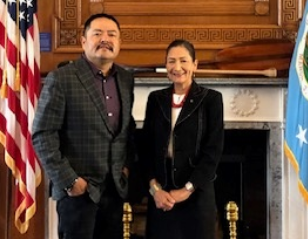
- Details
- By Levi Rickert
The U.S. Department of Interior announced on Friday that it will work with the San Carlos Apache Tribe to develop a plan to address electric power outages caused by repeated transmission line failures that have caused extreme hardship on the Reservation.
San Carlos Apache Tribe Councilman Eugene “David” Nozie met with Interior Secretary Deb Haaland on Sept. 9 in Washington to discuss the San Carlos Irrigation Project’s (SCIP) failure to provide reliable electricity for the reservation.
“Secretary Haaland said the department would form a working group with the Tribe as soon as possible to determine the best options to alleviate the power outages caused by repeated transmission line failures,” Councilman Nozie said. “We are grateful Secretary Haaland is committed to finding a solution to this serious problem that the threatens the health and welfare of Reservation residents, businesses and essential services.”
Last month, the SCIP main transmission line into the Reservation failed during a monsoon storm, leaving communities without power for 21 hours in the sweltering summer heat. The outage was just the latest in a long history of power failures.
“Power outages are all too frequent, some lasting for hours and some lasting days, paralyzing the Tribe’s essential facilities, cellular communications, government services, and water delivery,” said San Carlos Apache Tribe Chairman Terry Rambler. “We look forward to working with Secretary Haaland to find a permanent solution to this chronic problem.”
The SCIP was established in 1924 by the department’s Bureau of Indian Affairs to provide irrigation water and pumping to private landowners and electricity to residents on and off the Reservation.
The SCIP has 1,894 residential and 355 commercial Reservation customers. The Tribe has repeatedly requested federal authorities to replace the transmission line and construct a new access route along U.S. Highway 70.
More Stories Like This
Native News Weekly (August 25, 2024): D.C. BriefsUS Presidents in Their Own Words Concerning American Indians
Hozhonigo Institute Helps Drive $34.5M in Grant Pipeline for Tribal Communities
Torres, LaMalfa Lead Push to Safeguard Culturally Important Tribal Seed Varieties
Navajo Mother Welcomes Federal Charges in 2020 Killing of Her Son
Help us defend tribal sovereignty.
At Native News Online, our mission is rooted in telling the stories that strengthen sovereignty and uplift Indigenous voices — not just at year’s end, but every single day.
Because of your generosity last year, we were able to keep our reporters on the ground in tribal communities, at national gatherings and in the halls of Congress — covering the issues that matter most to Indian Country: sovereignty, culture, education, health and economic opportunity.
That support sustained us through a tough year in 2025. Now, as we look to the year ahead, we need your help right now to ensure warrior journalism remains strong — reporting that defends tribal sovereignty, amplifies Native truth, and holds power accountable.
 The stakes couldn't be higher. Your support keeps Native voices heard, Native stories told and Native sovereignty defended.
The stakes couldn't be higher. Your support keeps Native voices heard, Native stories told and Native sovereignty defended.
Stand with Warrior Journalism today.
Levi Rickert (Potawatomi), Editor & Publisher


